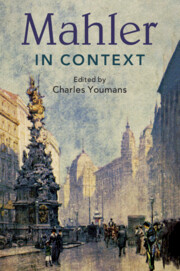Book contents
- Mahler in Context
- Composers in Context
- Mahler in Context
- Copyright page
- Dedication
- Contents
- Figures
- Music Examples
- Notes on Contributors
- Preface and Acknowledgments
- Abbreviations
- Part I Formation
- Part II Performance
- Part III Creation
- Part IV Mind, Body, Spirit
- Part V Influence
- Chapter 27 Posthumous Reputation, 1911 to World War II
- Chapter 28 Mahler and the Second Viennese School
- Chapter 29 The Mahler Revival
- Chapter 30 Broader Musical Influence
- Chapter 31 Adorno
- Chapter 32 Influences in Literature
- Chapter 33 Mahler on Disc
- Chapter 34 Film and Recent Popular Culture
- Further Reading
- Index
Chapter 28 - Mahler and the Second Viennese School
from Part V - Influence
Published online by Cambridge University Press: 18 December 2020
- Mahler in Context
- Composers in Context
- Mahler in Context
- Copyright page
- Dedication
- Contents
- Figures
- Music Examples
- Notes on Contributors
- Preface and Acknowledgments
- Abbreviations
- Part I Formation
- Part II Performance
- Part III Creation
- Part IV Mind, Body, Spirit
- Part V Influence
- Chapter 27 Posthumous Reputation, 1911 to World War II
- Chapter 28 Mahler and the Second Viennese School
- Chapter 29 The Mahler Revival
- Chapter 30 Broader Musical Influence
- Chapter 31 Adorno
- Chapter 32 Influences in Literature
- Chapter 33 Mahler on Disc
- Chapter 34 Film and Recent Popular Culture
- Further Reading
- Index
Summary
This chapter considers the reception of Mahler by Schoenberg, Berg, and Webern, with particular attention to parallel threads of interpretation. On one hand, the triumvirate championed their idol with determination and perseverance, to make a place for him in the centuries-long progression of Western compositional history and to establish as the culmination of this history (at least provisionally) their own works, with Schoenberg’s twelve-tone method as its most advanced expression. But another, backward-looking Second Viennese interpretation of Mahler’s music existed from the beginning: as the last manifestation of a musical paradise eternally closed to subsequent composers, who, unlike Mahler, rejected the commandment to leave tonality intact. As self-styled heirs, then, the Second Viennese School faced an irresolvable dilemma: their succession through an initially “atonal” and then dodecaphonic language required the destruction of this paradise, which existed on a tonal foundation.
- Type
- Chapter
- Information
- Mahler in Context , pp. 242 - 250Publisher: Cambridge University PressPrint publication year: 2020

